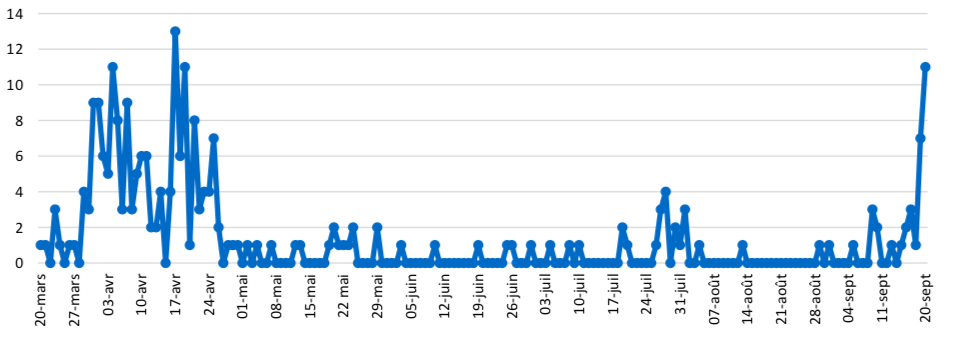-
Regional update: 11 new cases
The Gaspé Peninsula and Magdalen Islands Public Health Board is reporting 11 new cases of COVID-19. Seven of the cases are located in the MRC of Avignon and four are located in the Côte-de-Gaspé MRC. Tracing is underway for all the cases.
There is currently an outbreak at the CHSLD in Maria
According to Public Health, so far, seven residents and less than five staff members at Maria CHSLD (government owed long-term care facility) have tested positive for COVID-19.
That CHSLD houses 91 residents and nearly 130 employees work there.
When there are fewer than five cases, the exact number is not released because of privacy concerns.
Complete portrait
The total number of COVID-19 cases in the Gaspé Peninsula and Magdalen Islands is now 246. Presently, 215 individuals have recovered (87.4%). There are 22 active cases in the region (8.9%). Currently, there are not any COVID-19-related hospitalizations from the region.
Public Health also states that since the situation is constantly evolving, at times there may be a gap between official INSPQ numbers and their numbers.
Regional: MRC of Residence of the Cases
MRC / living environment Confirmed cases Rate per 100,000 Active Cases Avignon (+7)
– Community (+4)
– Manoir du havre
– Residence Saint Joseph (+3)107
65
28
14726.6
441.4
NA
NA16
9
0
7Bonaventure 58 332 0 Rocher-Percé 35 206 0 Côte-de-Gaspé (+4) 25 142.8 6 Haute-Gaspésie 10 91.4 0 Magdalen Islands 11 88.4 0 Gaspé Peninsula Magdalen Islands 246 273.1 22 (8.9%) Source: Gaspé Peninsula Public Health Board.
Evolution of new cases regionally

The totals for the province are as follows:
Cases Deaths Hospitalizations ICU 68,128 (+586) 5,804 (*+3/-1) 148 (+10) 30 (-1) *Three of the deaths occurred between September 14 and 19 and another death was removed after an investigation confirmed COVID-19 wasn’t the cause of death. -
Be a good citizen
As the COVID-19 pandemic wreaks havoc in most our lives, many are wondering what they can do to help. It might be difficult to think of ways you can help during this pandemic while following measures and isolating yourself, but there are many ways you can, and they all start with being a good citizen.
How to be a good citizen in a time of crisis?
Be honest and trustworthy: Tell the truth, it’s that simple. If you have symptoms, call the hotline (1 877 644 4545). Don’t lie to health care professionals.
Have integrity: Use your moral compass; do not cave in to peer pressure. This means saying “no” to a dinner invite, or choosing to not “shame” a victim of COVID-19.
Follow the rules and laws: Our government has laws in place to protect all of us. During a pandemic it is even more important to follow these laws. The measures put in place by the governments are based on science and are our best defence against the virus.
Possess self-discipline: Take control and motivate yourself to do the right thing. As tempting as it may be, this is not the time to make unnecessary trips. Manage your household to avoid running errands unless absolutely necessary. Remember if someone doesn’t live under your roof, you shouldn’t be in contact with them. So, you can’t go and have a morning coffee with your mom, but you can still call or Facetime and have chat, but from your respective homes.
Take responsibility: Be accountable for your actions. If you’ve travelled, be accountable and follow the quarantine measures.
Be informed: Knowledge is power, but only if that knowledge is accurate and used properly. Ensure that your information is from a reliable source (TV, Radio, Newspaper) and is relevant to your region. Do not share news that isn’t from a reliable source. Remember, your friends and family trust you and will assume news shared from you is accurate. Providing false news or inaccurate news (ex. measures taken in a different province or country) can confuse people, especially in a time of crisis when stress is already at the max.
Be compassionate: If you are able, volunteer to help those in need. Perhaps a senior nearby needs help with groceries. Charities will be feeling the pinch; reach out to them and if you are able, make a donation by e-transfer.
Be tolerant: Your friends and family will need your patience, understanding and acceptance, now more than ever. Be tolerant of their beliefs. Remember to treat others how you would like to be treated.
Be a good neighbour: Call your neighbours and “check in” with them, especially those over 70. If your neighbours are high risk (seniors, weak immune system, etc.), offer to take out their trash or recycling. Perhaps the young mother next door needs someone to talk to or maybe you can help her by Facetiming with her child while she prepares a meal. Lessen your neighbour’s burdens.
Be courageous and brave: Stand up for what you consider is right. While others are “shaming” COVID-19 victims, be the person who offers an encouraging word. Be the person others will look up to. Be brave, learn a new skill and teach a new skill to your children. Tackle each day knowing you are doing your best to help combat the spread of COVID-19.
Remember that your individual actions matter and what you choose to do can have a positive impact on those in your community. You have the power to take action and make decisions that will keep you and your community safe, while minimizing the stress of others. Be that person! Be a good citizen!

